1 de enero 2023

The Return of the Military

PUBLICIDAD 1M
PUBLICIDAD 4D
PUBLICIDAD 5D
We summarize the 11 most prominent news items during the year for Nicaraguans living under the Ortega-Murillo dictatorship
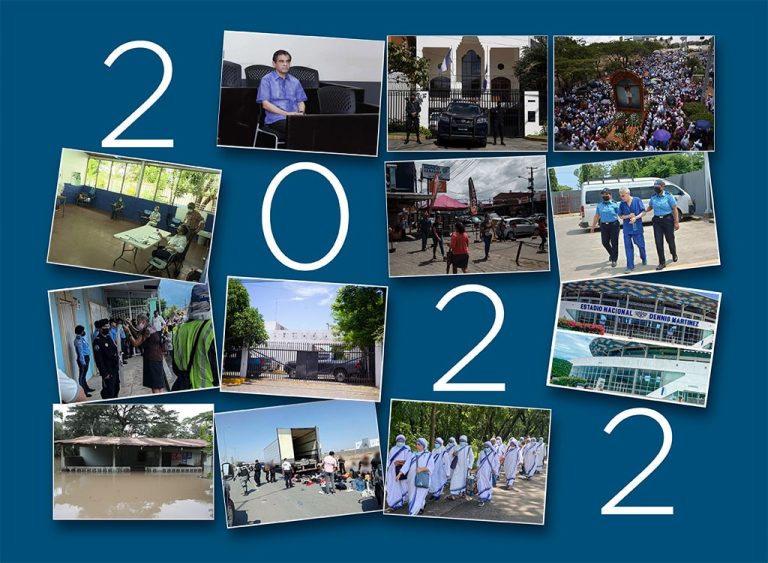
If 2021 was the year of annulled elections and an end to political competition, 2022 was the year when the dictatorship accelerated their total closure of independent civic spaces in the country. Below are the eleven news items that marked this year for Nicaraguans.
The repressive crusade the regime of Daniel Ortega and Rosario Murillo launched against the Catholic Church marked the political year 2022 in Nicaragua. Their relentless attack left Bishop Rolando Alvarez a political prisoner, formally accused of “conspiracy”. It also left 11 other religious leaders in jail, while dozens of priests were banished or fled into exile, including the Vatican diplomat, the Apostolic Nuncio, who was expelled from the country.

Monsignor Rolando Alvarez, just hours before a police contingent forced him to remain inside the Matagalpa curia. Photo: Matagalpa dioceses
Monsignor Rolando Alvarez, bishop of the Matagalpa dioceses, has been under house arrest since August, after he was abducted from the Matagalpa curia where police were holding him prisoner. Meanwhile, his colleagues – priests Ramiro Tijerino, Sadiel Eugarrios, Jose Luis Diaz and Raul Gonzalez – are in the El Chipote jail, along with seminary students Melkin Centeno and Darvin Leiva, and the dioceses cameraman Segio Cardenal. All of them are accused of “conspiring to undermine the national integrity” and “spreading fake news.”
Two other priests are also in jail, accused of the same crimes: Father Oscar Benavidez from the Mulukuku parish in Nicaragua’s North Caribbean region, and Enrique Martinez from the Leon dioceses.
The regime shuttered at least a dozen radio stations and communications outlets of the Catholic Church and arrested two journalists that worked for the Matagalpa dioceses.
Ortega’s Police have also prohibited major religious processions in almost all parts of the country, including those celebrating the Holy Conception of Maria, the patron of Nicaragua, the processions for Saint Jerome in Masaya, and of La Merced in Matagalpa.
The year 2022 was also marked by a massive exodus of Nicaraguan migrants towards both the United States and Costa Rica, fleeing persecution, unemployment and the economic recession that’s been provoked by Nicaragua’s repression and political crisis.
Every month has seen tens of thousands of Nicaraguans leave the country, which in turn triggered the near collapse of attention at the Immigration Offices, where people seek passports, all over the country.
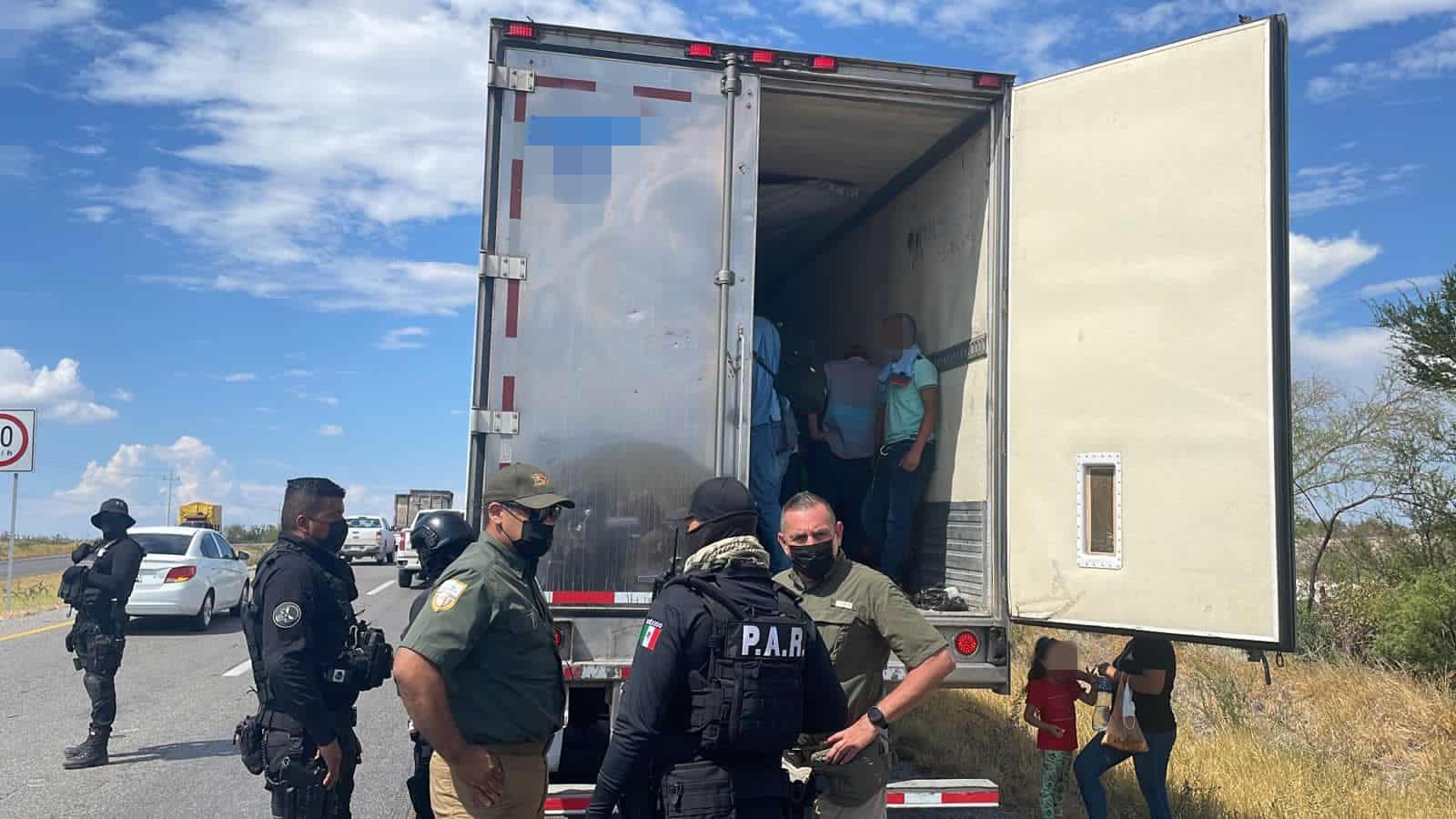
Nicaraguan migrants travel crowded together in a tractor trailer on Mexican Highway 57, between Monclova and Piedras Negras. Photo: IMN
According to the U.S. Office of Customs and Border Patrol, fiscal year 2022 saw the apprehension of over 164,000 Nicaragua migrants, a 224% increase over the previous fiscal year, when 50,000 Nicaraguans attempted to cross the US border.
The emigration crisis has also brought mourning to dozens of Nicaraguan families. According to migration organizations, around 40 Nicaraguans died in their attempt to reach the United States, most of them drowned in the Rio Grande or killed in traffic accidents.
One of the most dramatic cases was that of Clorinda Alarcon, who suffocated after being locked in the trailer of a truck that was later abandoned. Clorinda was pregnant, and also left orphaned a little girl who was with her.
The dictatorship gave the final blow to the policy of municipal autonomy in the November 6th municipal “elections”.
They declared themselves the winner in all of the country’s 153 municipalities, in a voting process held with essentially no political opponents, under a virtual police state and with an abstention rate over 80%.
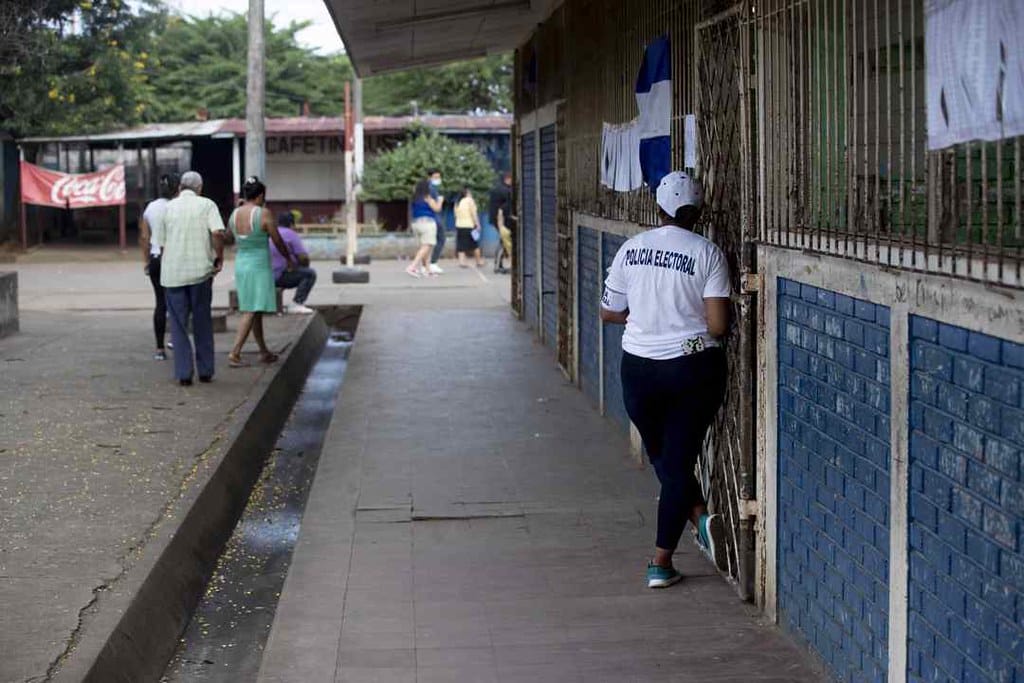
Una escasa participación ciudadana prevaleció en las votaciones municipales del 6 de noviembre de 2022. Foto: Confidencial | EFE.
The FSLN’s push for absolute control over the territories is part of their move towards a virtual one-party system.
The electoral period was also marked by the detention of approximately 62 more citizens, according to the Nicaragua Nunca Mas Human Rights Collective. The majority were later freed, but a dozen of those detained were held and charged with conspiracy and spreading fake news.
The organization Urnas Abiertas reported 1,158 denunciations of identity theft, on the part of people who were listed as candidates – usually for city council – for the very tiny “loyal opposition” parties, without their even being aware of this, let alone consenting.
Up until November, the regime had shuttered 3,106 non-profit organizations, amounting to 42.9% of the total number and virtually all the most active ones. Before 2018, 7,227 non-governmental organizations had legal status in the country.
The organizations that were closed include 1,614 nationally-based groups, 328 international NGOs, 363 trade associations, 287 religious organizations, 148 women’s associations, 60 medical groups, 151 neighborhood organizations, 82 cultural associations, 54 media outlets, 8 private universities, and 6 political parties.
An investigation carried out by Inter-American Dialogue found that the closure of the NGOs affected over a million Nicaraguans, who benefitted from the diverse social programs that these organizations implemented, programs that the regime can’t offer.
The majority of the canceled organizations carried out projects related to community development, social infrastructure, access to potable water, citizen participation and community development in the rural zones.
Nicaragua just passed its fifth consecutive Christmas with political prisoners in the jails. Former aspiring presidential candidates, political and civic leaders, bishops and priests, business leaders, activists, human rights advocates, journalists, students, professionals, rural leaders, and retired people all languish behind bars as the regime’s prisoners. They’re the victims of the state of terror the dictatorship has imposed to maintain absolute control in the country.
Family members of the political prisoners have denounced the regimen of torture and isolation that their relatives suffer, including a lapse of nearly 85 days without visits or contact between August and November. The prisoners’ minor children waited a year and a half before some were finally allowed to see their parents in the El Chipote jail.
The poor prison conditions and mistreatment cost the life of retired General and former guerrilla commander Hugo Torres, who died on February 12, while in the custody of the Ortega-Murillo regime.
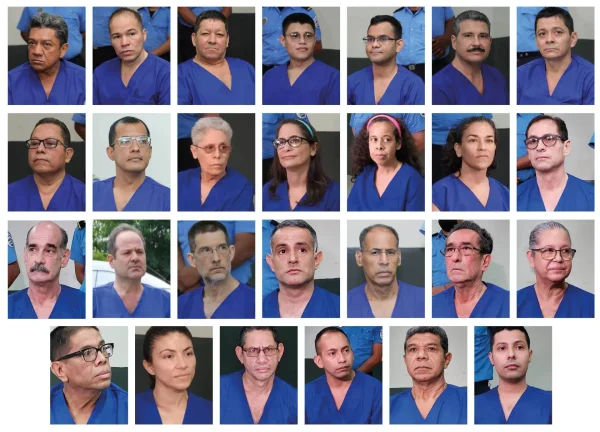
Some of Daniel Ortega’s 235 political prisoners.
In May, the cycle of spurious political trials against those citizens jailed in the context of the 2021 elections finally ended. Those “convicted” included seven aspiring presidential candidates.
All were declared guilty with no evidence and given sentences ranging from 9 to 13 years in prison. The majority were convicted of the catch-all crimes of “conspiring to undermine the national integrity,” and “propagation of fake news.”
The relatives of the political prisoners complained of degrading treatment during the majority of their visits, although in more recent visits on December 7 and 8 they received a more respectful reception on the part of the police in the jail complex.
The dictatorship extended their vengeance to include family members of those they sought to persecute politically. Several such family members were also imprisoned, when police were unable to arrest the person they had come to get.
The newest wave of detentions brought the number of political prisoners to 235. Meanwhile, the Ortega regime completely refused to comply with a mandate from the inter-American Court of Justice demanding the liberation of all the political prisoners.
In 2022, growing discontent broke out among the public employees, both civilian and military, against the regime of Daniel Ortega, which offers the people of Nicaragua no solutions to the national crisis.
OAS Ambassador Arturo McFields and international legal advisor Paul Reichler both resigned from their positions in protest. Many other functionaries resigned silently, or else became objects of surveillance and repression on the part of the regime.
Rivas Mayor Wilfredo Lopez was stripped of his position and later fled to the United States. Magistrate Ileana Perez was forced to resign from her post, and dissident historic combatant “El Chino” Enoc was arrested and charged with the supposed crime of drug trafficking. A number of lower Supreme Court functionaries were also jailed and accused of crimes by the regime.
Several public employees, under cover of anonymity, have told the independent media that they feel they’re being held hostage by Ortega and Murillo.
Nicaragua’s Central Bank projected in November a level of economic growth between 3.5% and 4.5%, marking a second year of growth following three years of recession.
The economic recovery is based on the growth of exports and family remittances. However, high rates of unemployment, poverty and massive migration continue.
At the close of 2022, family remittances to Nicaragua had increased 38%, according to the tendency observed up until August 2022, injecting an important dynamism into the family economy.
In 2022, dozens of countries voted in the OAS and the UN to condemn the repression and systematic human rights violations practiced by the regime of Ortega and Murillo.
The General Assembly of the Organization of American States (OAS) approved by voice vote a resolution of condemnation against the Ortega-Murillo regime, in which they also demanded the immediate release of the political prisoners.
The Human Rights Council of the United Nations also adopted a resolution establishing a Group of Experts charged with “carrying out an exhaustive and independent investigation of all the presumed “human rights violations” committed since 2018.
Another flank of the regime’s increasing isolation has been the sanctions imposed by the United States, the European Union and other countries, to those in the regime’s inner circle and on some government institutions.
On January 10, the United States and the European Union imposed sanctions on the Supreme Electoral Council, the National Police, and the Nicaraguan Telecommunications Institute, as well as on Camila Ortega Murillo and Laureano Ortega Murillo, both children of the presidential couple. Other sanctions included high regime functionaries.
This year, sanctions were also imposed on the mining sector in Nicaragua, specifically the Nicaraguan Mining Company and the General Office of Mines, and on some upper employees of these entities.
Certain judges, prosecutors and magistrates of the Judicial Power were also sanctioned for their role in the bogus trials of the political prisoners. Others sanctioned included some mayors, public functionaries and those close to the regime like Lenin Cerna, all of whom had been active participants in the repression exercised against the Nicaraguan citizens.
In 2022, the dictatorship of Daniel Ortega rejected all opportunities for dialogue with the international community. Instead, they confiscated the site of the OAS in Managua and declared six ambassadors “personas non grata”, among them that of Spain, Colombia, the Vatican, the United States, the European Union and the Netherlands.
Meanwhile, the regime tightened their alliance with Cuba and Venezuela, as well as with Russia and China, who promised political and economic support.
Ortega has openly supported Russia’s military invasion of Ukraine, in exchange for Russia’s political support for operations of espionage, disinformation and military support.
The regime is still waiting for China to come through on their economic promises. In 2022, they received a miscellaneous package of aid that was considerably inferior to the financing and technical support they had received from Taiwan, before breaking ties with that country.
The passage of Hurricane Julia over Nicaraguan territory in early October dealt yet another blow to the country, causing major damage to the infrastructure and causing the deaths of at least five people, although the government did not recognize these in any official way.
The regime declared a red alert in several zones of the country, especially the country’s Caribbean coast, due to the damage caused by the hurricane, estimated at 400 million dollars, or 2.6% of the country’s GNP according to official projections.
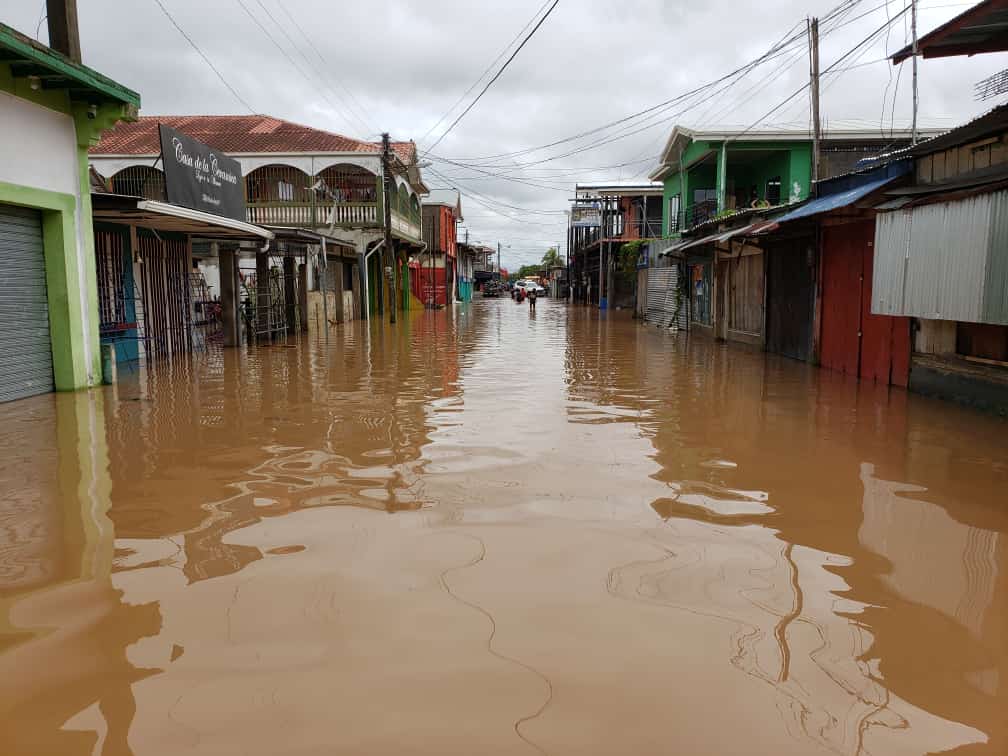
The Municipality of El Rama in Nicaragua’s South Caribbean region. The town was almost completely under water after the three rivers that join together in the zone all overflowed their banks during the passage of Hurricane Julia. Courtesy photo: Confidencial.
To help with the damage, the Central American Bank of Economic Integration donated half a million dollars to the Nicaraguan government. They also received a disbursement of 8.9 million dollars from Caribbean Catastrophe Risk Insurance Facility.
Up until now, the regime hasn’t issued any report on these two sums, while in the zones most affected by the hurricane, some of the scars are still visible, including schools without roofs and destroyed bridges.
The municipality of El Rama was one of the most affected places. Nearly the entire area was under water, with damage to the electrical infrastructure, the water services, and telephone and internet services that lasted for several days.
In Nicaragua, Confidencial declared Bishop Rolando Alvarez their 2022 Person of the Year, in recognition of his dignity in the face of the regime’s attacks against the Church, maintaining aloft the prophetic voice of the Catholic Church.
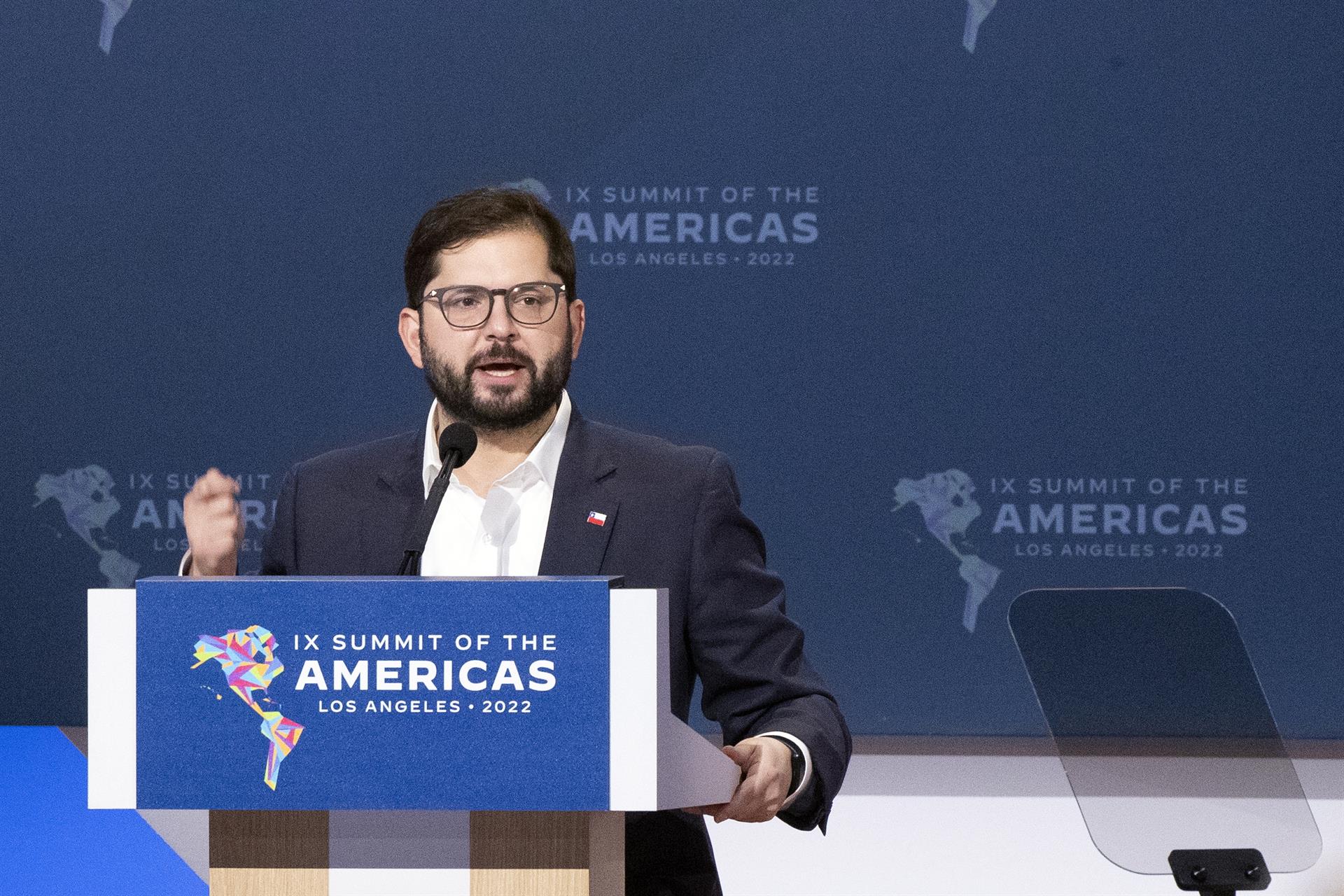
Gabriel Boric, President of Chile, speaks during the Summit of the Americas. Photo: EFE / Confidencial
In Latin America, the principal media outlets declared as Persons of the Year Chilean President Gabriel Boric, leader of a new democratic left in the region; Colombia’s new vice President Francia Marquez, who has become a symbol of Afro-Colombian women’s struggle for social inclusion and the fight against climate change; and Lula da Silva, president-elect of Brazil, whose national coalition beat the ultra-rightist incumbent Jair Bolsonaro.
Internationally, the consensus was that Ukranian President Volodomir Zelensky is the Person of the Year, as a symbol of the Ukranian people’s resistance against the invasion spearheaded by Russian President Vladimir Putin.
This article was originally published in Spanish in Confidencial and translated by Havana Times
Archivado como:
PUBLICIDAD 3M
Confidencial es un diario digital nicaragüense, de formato multimedia, fundado por Carlos F. Chamorro en junio de 1996. Inició como un semanario impreso y hoy es un medio de referencia regional con información, análisis, entrevistas, perfiles, reportajes e investigaciones sobre Nicaragua, informando desde el exilio por la persecución política de la dictadura de Daniel Ortega y Rosario Murillo.
PUBLICIDAD 3D